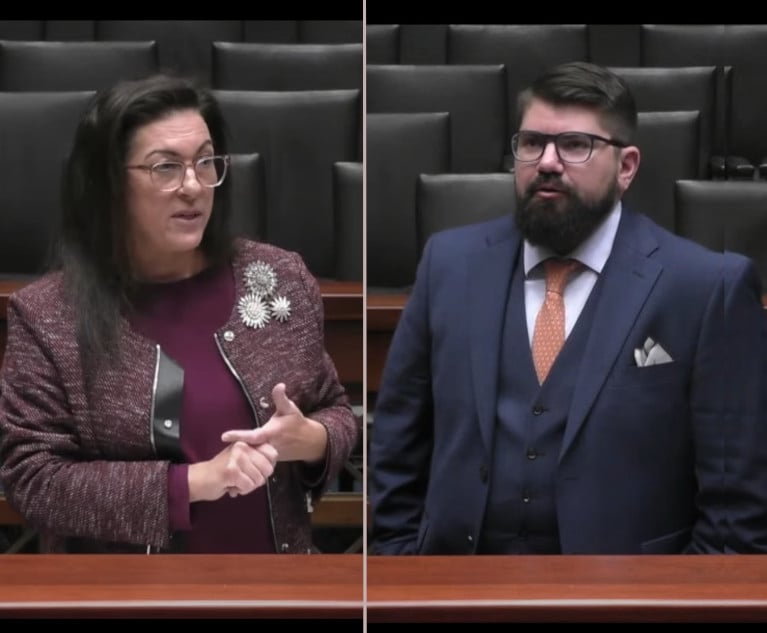 Rola Daaboul, special counsel with Akerman LLP in Austin. Courtesy photo
Rola Daaboul, special counsel with Akerman LLP in Austin. Courtesy photo New Possibilities For Employment Discrimination Emerge in Post-Pandemic Era
An employer's failure to provide the necessary protections and accommodations for their immunocompromised employees may subject them to liability for discrimination and retaliation under Title VII of the Civil Rights Act of 1964 and to claims under the Americans with Disabilities Act.
November 02, 2023 at 02:33 PM
7 minute read
While society as a whole has largely moved on from Covid-era restrictions and has returned to pre-pandemic norms, there are millions of individuals who are still stuck in what has been accurately referred to as "Pandemic Limbo." Immunocompromised individuals haven't had the luxury of letting their guard down—they are still paranoid to venture out in public, and when they do, they are still suffocating behind their masks, wondering if the limited time they spend engaging with society will lead to a hospital stay or even worse. Those protections that were previously in place to protect these individuals have been largely, if not fully, abandoned by states, cities and employers. Mask mandates are now a relic of the past and flexible work options continue to be curtailed. As the world moves on, the potential for new, unrecognized constitutional violations in the workplace still linger. Approximately 3% of the population in the United States—about 7 to 10 million people—is immunocompromised and less capable of fighting infections due to alterations in the immune system. This significant swath of the population has been forced to navigate the post-pandemic return to work in environments that do not appreciate the daily risks they face or otherwise provide protections or accommodations that ensure their health and safety is protected. In the workplace, an employer's failure to provide the necessary protections and accommodations for their immunocompromised employees may subject them to liability for discrimination and retaliation under Title VII of the Civil Rights Act of 1964 and to claims under the Americans with Disabilities Act.
Title VII makes it unlawful for an employer to discriminate against someone on the basis of race, color, national origin, sex (including pregnancy, sexual orientation and gender identity), creed or religion, genetic information, age, veteran status, citizenship, and physical or mental disabilities. Each of these categories is referred to as a "protected class." In addition, Title VII prohibits retaliation against a person because they complained about discrimination, filed a charge of discrimination (such as internal charges filed with the employer's equal opportunity office or human resources department or external charges filed with the Equal Employment Opportunity Commission or Texas Workforce Commission), or participated in an employment discrimination investigation or lawsuit. Critically, Title VII does not only prohibit intentional discrimination—practices having the effect of discriminating against individuals because of their protected class are also barred.
This content has been archived. It is available through our partners, LexisNexis® and Bloomberg Law.
To view this content, please continue to their sites.
Not a Lexis Subscriber?
Subscribe Now
Not a Bloomberg Law Subscriber?
Subscribe Now
NOT FOR REPRINT
© 2025 ALM Global, LLC, All Rights Reserved. Request academic re-use from www.copyright.com. All other uses, submit a request to [email protected]. For more information visit Asset & Logo Licensing.
You Might Like
View All
Houston Appeals Court Split Over Race Discrimination Suit Involving COVID-19 Vaccine Distribution
4 minute read
Overtime Rewind: Texas Court Ruling Unravels FLSA Salary Level Increases
4 minute read
'It's Like They Lynched You:' Law Professor's Discrimination Claim Reaches High Court
7 minute readTrending Stories
- 1Big Law Begins 2025 With Boston Laterals and Deals
- 2Vinson & Elkins Expands Environmental Team with Chair of Texas Commission on Environmental Quality
- 3From Courtrooms to Conversations: The Unexpected Joys of Podcasting as a Lawyer
- 4'A More Nuanced Issue': NJ Supreme Court Considers Appellate Rules for Personal Injury Judgments
- 5Drake Sues UMG for Defamation Over Promotion of False Claims of Pedophilia
Who Got The Work
J. Brugh Lower of Gibbons has entered an appearance for industrial equipment supplier Devco Corporation in a pending trademark infringement lawsuit. The suit, accusing the defendant of selling knock-off Graco products, was filed Dec. 18 in New Jersey District Court by Rivkin Radler on behalf of Graco Inc. and Graco Minnesota. The case, assigned to U.S. District Judge Zahid N. Quraishi, is 3:24-cv-11294, Graco Inc. et al v. Devco Corporation.
Who Got The Work
Rebecca Maller-Stein and Kent A. Yalowitz of Arnold & Porter Kaye Scholer have entered their appearances for Hanaco Venture Capital and its executives, Lior Prosor and David Frankel, in a pending securities lawsuit. The action, filed on Dec. 24 in New York Southern District Court by Zell, Aron & Co. on behalf of Goldeneye Advisors, accuses the defendants of negligently and fraudulently managing the plaintiff's $1 million investment. The case, assigned to U.S. District Judge Vernon S. Broderick, is 1:24-cv-09918, Goldeneye Advisors, LLC v. Hanaco Venture Capital, Ltd. et al.
Who Got The Work
Attorneys from A&O Shearman has stepped in as defense counsel for Toronto-Dominion Bank and other defendants in a pending securities class action. The suit, filed Dec. 11 in New York Southern District Court by Bleichmar Fonti & Auld, accuses the defendants of concealing the bank's 'pervasive' deficiencies in regards to its compliance with the Bank Secrecy Act and the quality of its anti-money laundering controls. The case, assigned to U.S. District Judge Arun Subramanian, is 1:24-cv-09445, Gonzalez v. The Toronto-Dominion Bank et al.
Who Got The Work
Crown Castle International, a Pennsylvania company providing shared communications infrastructure, has turned to Luke D. Wolf of Gordon Rees Scully Mansukhani to fend off a pending breach-of-contract lawsuit. The court action, filed Nov. 25 in Michigan Eastern District Court by Hooper Hathaway PC on behalf of The Town Residences LLC, accuses Crown Castle of failing to transfer approximately $30,000 in utility payments from T-Mobile in breach of a roof-top lease and assignment agreement. The case, assigned to U.S. District Judge Susan K. Declercq, is 2:24-cv-13131, The Town Residences LLC v. T-Mobile US, Inc. et al.
Who Got The Work
Wilfred P. Coronato and Daniel M. Schwartz of McCarter & English have stepped in as defense counsel to Electrolux Home Products Inc. in a pending product liability lawsuit. The court action, filed Nov. 26 in New York Eastern District Court by Poulos Lopiccolo PC and Nagel Rice LLP on behalf of David Stern, alleges that the defendant's refrigerators’ drawers and shelving repeatedly break and fall apart within months after purchase. The case, assigned to U.S. District Judge Joan M. Azrack, is 2:24-cv-08204, Stern v. Electrolux Home Products, Inc.
Featured Firms
Law Offices of Gary Martin Hays & Associates, P.C.
(470) 294-1674
Law Offices of Mark E. Salomone
(857) 444-6468
Smith & Hassler
(713) 739-1250







